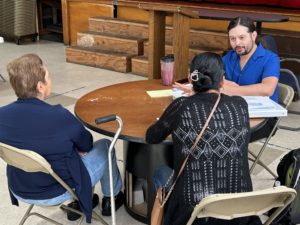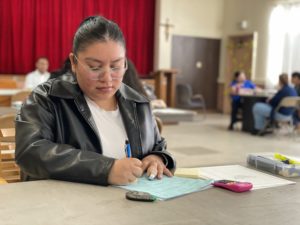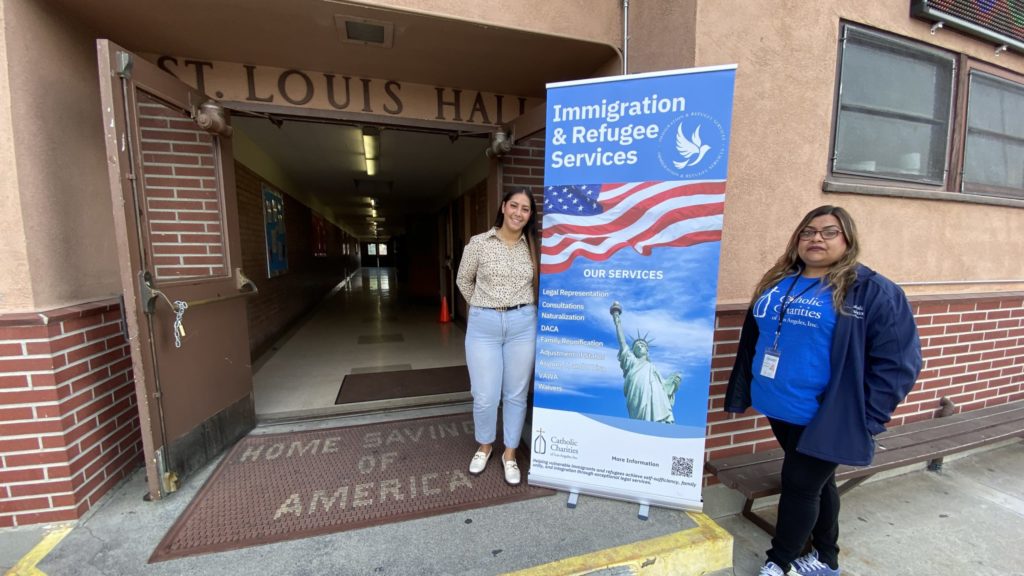When Francisco Hernandez emigrated from El Salvador to the United States in 1989 fleeing poverty, unrest, and civil war, he made the trek with nothing but the clothes on his back.
Over the years he formed a family, found economic stability, and became a legal U.S. resident.
Today, Hernandez and his wife, Rosa — also from El Salvador — are eagerly hoping to achieve what they consider to be the capstone of their immigration journey: becoming U.S. citizens.
“Citizenship is not a right, it is a privilege,” he said during a recent citizenship workshop at St. Louis of France in La Puente. “It is the highest level that one can attain in this country.”
Representatives of local Catholic agencies said they’re seeing an increase in immigrants — like the Hernandezes, seeking to become legal residents or citizens as the presidential election nears in November — and are ramping up outreach efforts to help them.
They said many of those who qualify but have not yet started the process are feeling an urgency to do so now in case policies change after a new president is inaugurated.

“We’re ensuring that we stay ahead of this and get people on board with their civic responsibility to make sure they’re doing what they can to exercise their right,” said Isaac Cuevas, director of immigration and public affairs for the Archdiocese of Los Angeles. “This is our opportunity to encourage people to look at those opportunities, to go forward with them.”
Jaqueline Perez Herrera Alonso, a program coordinator for Catholic Charities of Los Angeles’ division of immigration and refugee services, was among those who organized the workshop that the Hernadezes attended in July.
Alonso said her group has seen a recent uptick in the number of people asking about residency and citizenship requirements and aims to meet the need by offering more legal services in the community.
The organization offers both consultation clinics — where immigrants can learn more about what they are eligible to apply for — and citizenship workshops to help them move forward with citizenship applications, plus residency and Deferred Action for Childhood Arrivals (DACA) renewals.
Alonso said she’s begun partnering with churches and adult schools to bring immigration services to areas where they are currently lacking, especially in cities further out in Los Angeles County, like Baldwin Park and La Puente.
Many potential applicants are elderly and lack transportation, she said, so bringing services to where they live is critical.
“Our mission is to provide legal services so that people can become self-sufficient,” she said. “For so many of these people, becoming a citizen will change their lives in so many different ways.”

Alonso, a DACA recipient, said obtaining legal status changed her own life by allowing her to receive financial aid while attending UC Santa Barbara and seek employment after graduation.
“I feel so privileged,” she said. “Providing them with any help that I can gives me a reason to come to work every day.”
Cuevas said the archdiocese is also noticing a growing number of people interested in becoming residents or citizens as the election looms.
In response, he said, the archdiocese is offering more workshops to help migrants better understand their rights, and the chance to meet with attorneys to see if they, or their families, qualify for legal status adjustments.
Cuevas said the archdiocese has also seen an increase in the number of migrants and refugees seeking assistance at area churches, and is launching training sessions to help pastors, staff, and ministry leaders address their varied needs.
Last summer, the archdiocese and its partner organizations were busy assisting busloads of asylum-seekers sent to Los Angeles by Texas Gov. Greg Abbott.
Today, the buses have stopped but “more and more” individual families from countries like Venezuela, Honduras, El Salvador, and others, are coming up from the border on their own into Los Angeles, Cuevas said.
Some of those who’ve been in the city for several months without connecting to resources or a support system have ended up living on the streets, he said.
The new trainings will teach “first responders” how to direct new arrivals to the resources they need, whether they are looking to join family and friends in another state or set down permanent roots in the city, he said.
Workshop participants will also be reminded why the Church is compelled to help migrants and refugees from a faith perspective, he said.
“From a pastoral standpoint, our brothers and sisters are in need and as people of faith, it’s our responsibility to answer that call, to accompany them, to be with them,” Cuevas said. “Independent of whatever their status is, we look at the person first, and not where they are in their legal process.”
More than 30 years have passed since the Hernandezes moved from El Salvador to the U.S.
After having children and establishing a home in Pasadena, they say there’s no time like the present to apply for citizenship.
Leaving the recent workshop armed with the names of people who can help them and information on how they can apply, both said they are intent on completing the process.
Becoming citizens will solidify their standing in their adopted country and allow them to participate in the political process by giving them the right to vote, they said.
“Even though it seems difficult, we can do it,” Rosa Hernandez said. “This is our main focus.”

